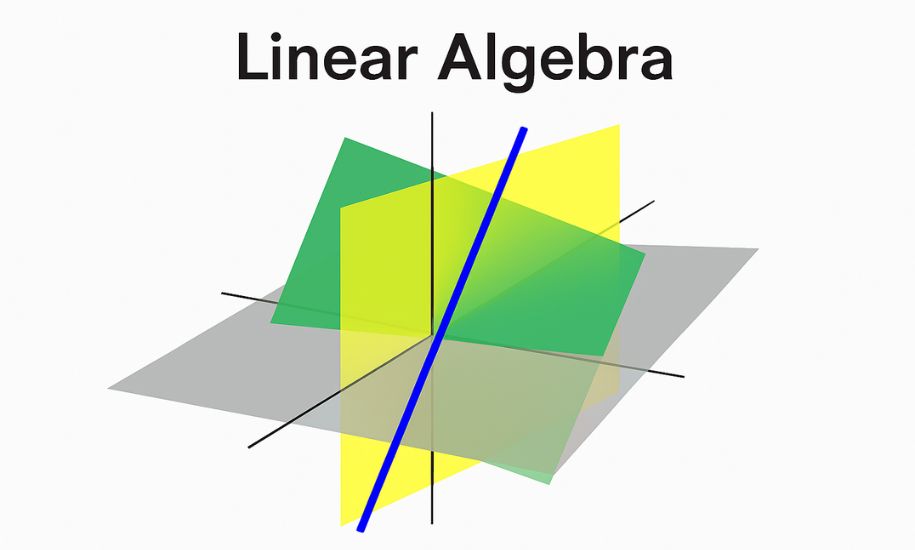Khan Academy Linear Algebra: The Ultimate Guide for Learners and Self-Studyers
In the evolving landscape of online education, few names resonate as strongly as Khan Academy. Known for democratizing access to ...

Linear Algebra is a cornerstone of modern mathematics and its applications in science, engineering, computer science, economics, and beyond. Whether you’re solving a system of equations or training a neural network, linear algebra is working behind the scenes.
In this article, we’ll cover What is Linear Algebra, its core concepts, examples, best books, problem-solving strategies, real-world applications, and even how it powers machine learning.
Linear Algebra is the study of vectors, vector spaces (also called linear spaces), linear mappings between these spaces, and systems of linear equations. It’s essential in both pure and applied mathematics.
At its heart, linear algebra deals with:
Scalars, vectors, matrices, and tensors
Linear transformations
Matrix algebra
Systems of linear equations
Eigenvalues and eigenvectors
Universal Application: From 3D game graphics to economic modeling, it’s everywhere.
Foundational for STEM: Physics, engineering, and data science rely heavily on it.
Essential for AI: Machine learning models are built using matrix operations and vectorized functions.
A scalar is a single number.
A vector is a list of numbers (1D array) that represents magnitude and direction.
A matrix is a 2D array of numbers used to represent linear transformations.
Matrices can be added, multiplied, transposed, and inverted.
A vector space is a set of vectors that can be scaled and added.
Examples: ℝ² (2D space), ℝ³ (3D space)
Functions that preserve vector addition and scalar multiplication.
Represented as matrix multiplications.
Sets of equations like:
2x + 3y = 5
4x - y = 1
These systems can be solved using:
Determinants show whether a system has a unique solution.
Inverse matrices help solve equations like AX = B.
For matrix A and vector x: A * x = λ * x
Eigenvectors are unchanged in direction by A; λ is the eigenvalue.
Crucial in PCA, quantum mechanics, and stability analysis.
Here are some highly respected texts:
Linear Algebra Done Right – Sheldon Axler
Introduction to Linear Algebra – Gilbert Strang
Elementary Linear Algebra – Howard Anton
Linear Algebra and Its Applications – David C. Lay
Matrix Analysis – Roger Horn & Charles Johnson (Advanced)
x + y = 5
2x - y = 4
Add equations:
3x = 9 ⇒ x = 3
Then y = 2
A = [[1, 2], [3, 4]]
B = [[2, 0], [1, 2]]
AB = [[4, 4], [10, 8]]
For matrix A = [[2, 0], [0, 3]],
Eigenvalues: 2 and 3
Data Representation: Features = vectors; datasets = matrices
Neural Networks: Weight updates = matrix operations
PCA (Principal Component Analysis): Uses eigenvalues/eigenvectors
Optimization: Gradient descent involves matrix calculus
Computer Graphics: 3D transformations and projections
Engineering: Load balancing, network design, control systems
Statistics: Regression analysis, PCA, correlation matrices
Finance: Risk modeling, forecasting, economic simulations
Physics: Quantum mechanics, motion equations, waveforms
Solve:
3x + y = 7
x - 2y = -1
Solution:
x = 1, y = 4
Find the determinant of:
| 4 2 |
| 3 1 |
Solution:
Det = (4 × 1) – (2 × 3) = 4 – 6 = -2
Include graphs, matrices, vectors, coordinate planes, and solved equations to help visualize abstract concepts.
Linear Algebra is more than just matrix math—it’s the mathematical framework for modern technology and analytical thinking. Whether you’re in high school, college, or building AI models, understanding linear algebra is a must.
For more in-depth educational content on linear algebra and other math topics, visit PureAcad.com — where we make learning pure and powerful.
In the evolving landscape of online education, few names resonate as strongly as Khan Academy. Known for democratizing access to ...
Linear algebra is a cornerstone of modern mathematics and a crucial tool for disciplines like engineering, physics, computer science, data ...
Linear algebra serves as a cornerstone in advanced mathematics, physics, computer science, and engineering. Among its fundamental concepts, the idea ...
In the study of linear algebra, few concepts are as pivotal as eigenvalues and eigenvectors. These mathematical tools reveal insights ...
Vector spaces and subspaces are foundational topics in linear algebra and serve as essential tools for modeling, problem-solving, and computation ...
Matrices and matrix operations are core elements of linear algebra and have widespread applications across engineering disciplines. Whether you're studying ...
Understanding scalars and vectors is one of the foundational building blocks in both physics and linear algebra. These two types ...
Linear Algebra is one of the most critical mathematical foundations for engineering students. It’s not just a subject—it’s a tool ...
Linear Algebra is one of the most powerful and essential branches of mathematics, forming the foundation of countless modern applications ...

PureAcad.com is your trusted platform for high-quality, distraction-free educational content. We provide clear, well-structured lessons, guides, and resources across mathematics, science, languages, and more—designed to support students, educators, and lifelong learners. Learn better. Grow smarter. Only at PureAcad.
© 2025, Pure Acad - Pure Learning.
© 2025, Pure Acad - Pure Learning.